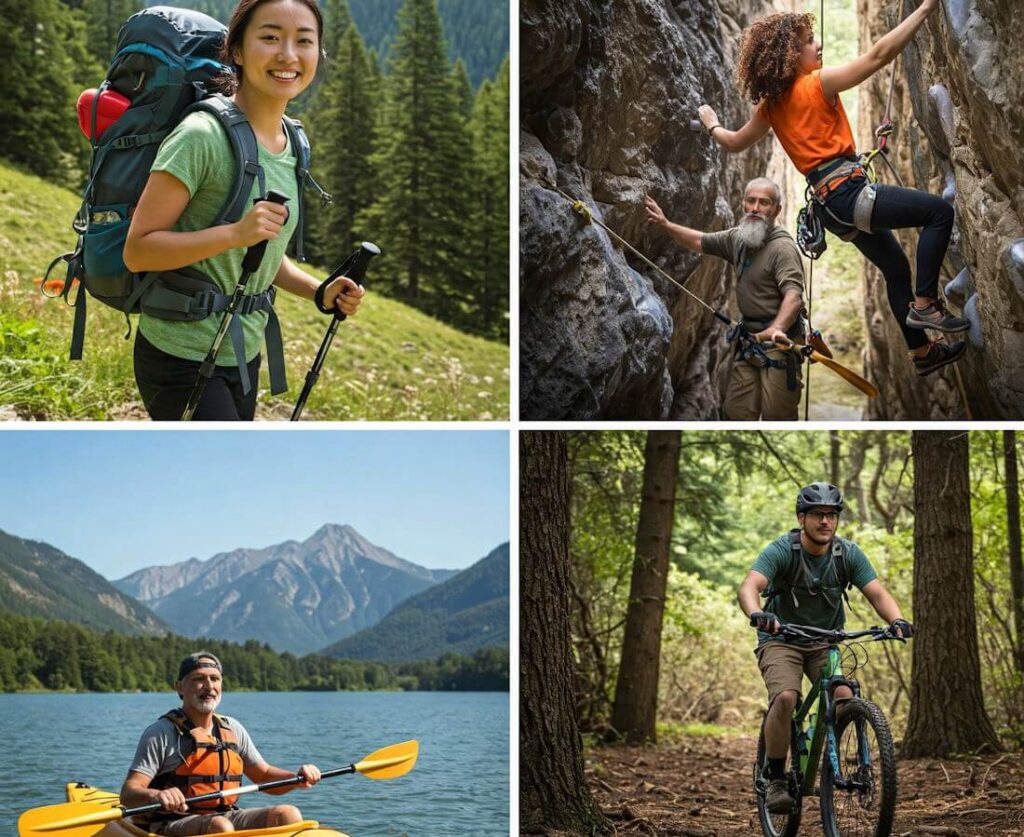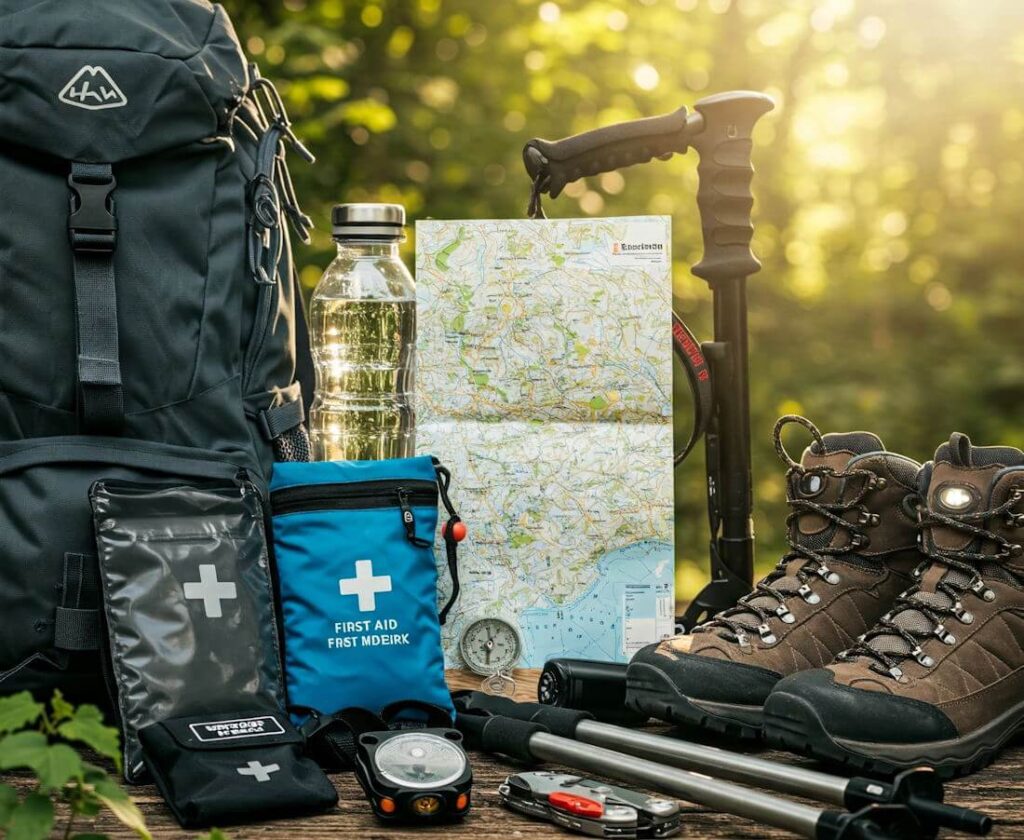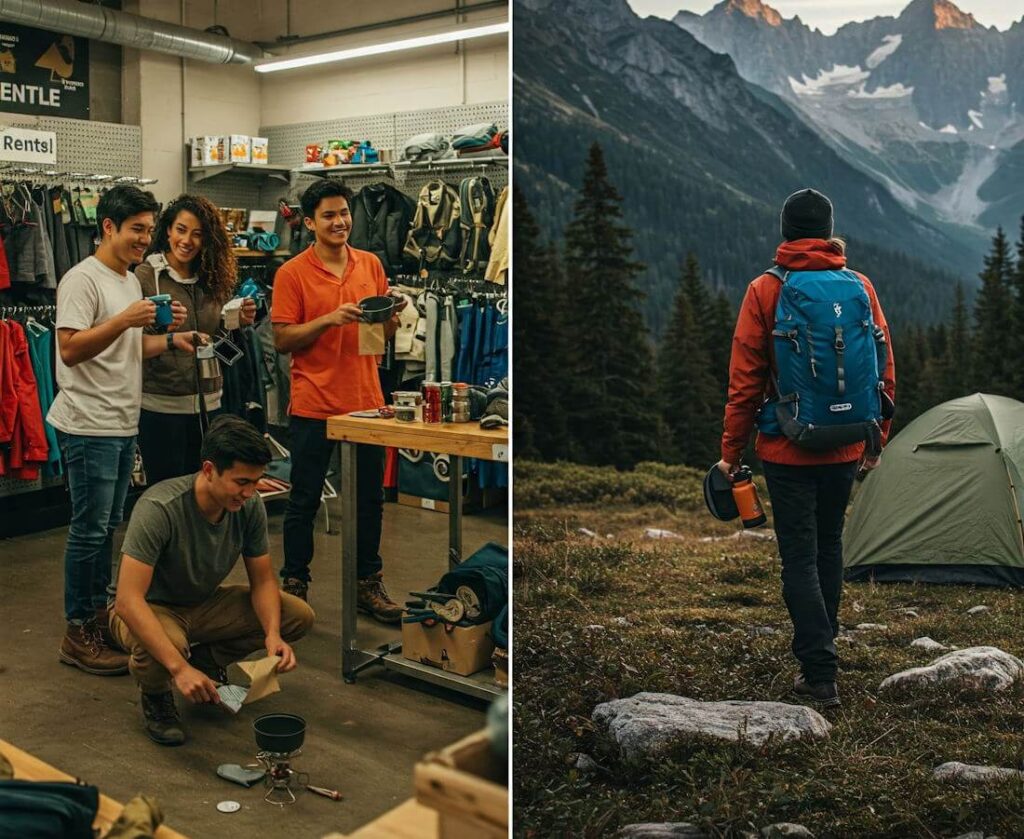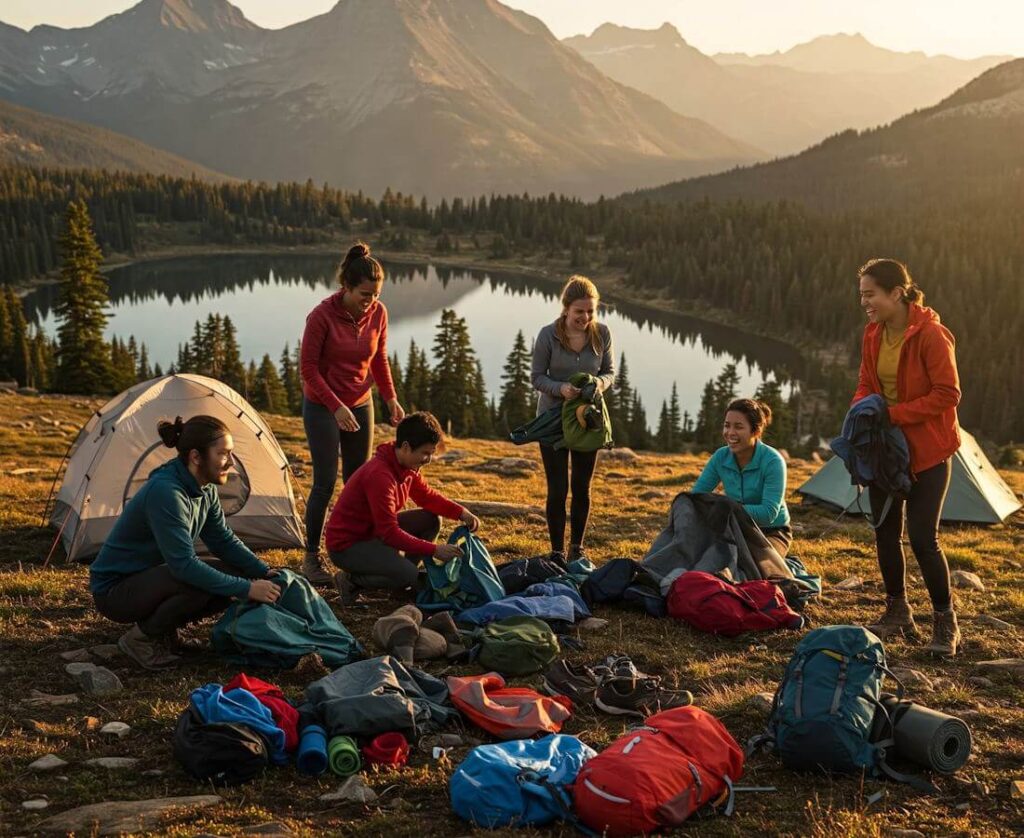The gear rental industry has notably transformed over recent years, adapting to the evolving preferences of outdoor enthusiasts. This sector encompasses a diverse array of equipment that caters to numerous activities, including hiking, camping, skiing, and climbing. Renting gear allows individuals to access high-quality equipment without the substantial upfront costs associated with purchasing. The increasing popularity of this model reflects a broader trend of convenience and flexibility sought after by modern adventurers.
Historically, outdoor equipment ownership was the norm for most enthusiastic participants in outdoor activities. However, as the appreciation for recreational pursuits has expanded, so too has the realization that renting can provide significant advantages. Today’s outdoor enthusiasts are often seeking to experience a variety of activities without the financial burden of acquiring specialized gear for each endeavor. The growing prevalence of rental services has made it easy for individuals to try new pastimes with the security of well-maintained, high-performance equipment at their disposal.
Various types of outdoor gear are now available for rental, ranging from tents, backpacks, and sleeping bags for camping, to skis, snowboards, and boots for winter sports. Additionally, climbing harnesses, ropes, and helmets are just a few of the options for those who enjoy vertical pursuits. As these services continue to evolve, they increasingly offer equipment that is not only high-quality but also up-to-date with the latest technological advancements. This focus on quality and performance enhances the overall outdoor experience, making gear rental an appealing option for beginners and seasoned adventurers alike.
As society’s interaction with the outdoors becomes more dynamic, the gear rental industry is positioned to meet the growing demand, offering outdoor aficionados a pragmatic, cost-effective solution to enjoy their passions.
Cost-Effectiveness of Renting Gear
For outdoor enthusiasts, the decision to rent gear rather than purchase outright often presents a compelling financial argument. When weighing the costs associated with buying outdoor equipment, several factors come into play including initial purchase price, maintenance fees, storage requirements, and depreciation over time. Renting gear not only alleviates these financial burdens but can also provide access to a wider variety of equipment that may be inaccessible to those who prefer to own.
One of the primary expenses of owning outdoor gear is the initial outlay, which can be considerable. High-quality gear, whether it’s camping tents, climbing equipment, or skiing gear, often comes with a hefty price tag that can deter many potential buyers. Renting gear allows outdoor enthusiasts to access the latest and most advanced equipment without the upfront financial commitment. Moreover, rental companies frequently offer well-maintained and updated gear, ensuring that users experience the best technology available without the risks associated with ownership.
Maintenance is another key cost associated with owning outdoor equipment. Owners must regularly inspect, repair, and clean gear to keep it in good working condition, often incurring additional charges. Additionally, proper storage is necessary to avoid damage, leading to further costs in space and potential climate controls. Renting eliminates these expenses, freeing enthusiasts from the need for personal storage solutions or maintenance responsibilities.
Renting also provides a unique opportunity for outdoor enthusiasts to “try before you buy.” This enables individuals to assess the suitability of different types of gear without the pressure of a long-term commitment. This trial aspect allows consumers to make informed purchasing decisions, ensuring that they invest in equipment that truly meets their needs and preferences, ultimately leading to more satisfaction in their outdoor activities.
Access to High-Quality and Specialized Gear
For outdoor enthusiasts, having access to high-quality and specialized gear is essential for a fulfilling experience. Renting equipment presents a unique advantage, allowing individuals to utilize the latest advancements in technology and specialized gear that may otherwise be financially out of reach. This access can significantly enhance the quality of outdoor activities, from hiking and skiing to kayaking and rock climbing.
When embarking on different outdoor adventures, having the appropriate gear tailored to specific activities can make a substantial difference. For instance, renting top-of-the-line camping equipment, such as ultralight tents and sleeping bags, ensures a more comfortable and enjoyable experience, allowing enthusiasts to focus on their adventure rather than equipment limitations. Similarly, when engaging in winter sports, individuals can rent high-performance skis, snowboards, and other specialized gear, which are crucial for safety and performance.
Moreover, rental shops often carry a wide range of the latest models, so outdoor enthusiasts have the opportunity to test out current industry innovations without the commitment of a full purchase. For example, a climber can rent advanced climbing gear, including harnesses and ropes designed with cutting-edge materials that promote safety and durability. This not only enhances the climbing experience but also allows the individual to make informed decisions regarding future purchases based on hands-on trial.
Additionally, access to diverse gear options means that enthusiasts can tailor their equipment choices to the specific conditions of each trip, ensuring they are well-prepared regardless of the environment. Whether tackling rocky mountains or navigating serene waters, the right gear is a critical factor in ensuring safety and enjoyment. Ultimately, the ability to rent high-quality and specialized gear empowers outdoor enthusiasts to elevate their experiences while keeping costs manageable.
Convenience and Flexibility of Renting
Renting outdoor gear has revolutionized the way enthusiasts approach their activities, offering unparalleled convenience and flexibility. For many, the process begins with the ease of locating rental services, which are often strategically positioned near popular outdoor destinations. This accessibility allows individuals to pick up and return equipment with minimal effort, eliminating the cumbersome logistics typically associated with transporting bulky gear from home.
One of the most significant advantages of renting gear lies in the ability to secure equipment tailored for specific trips rather than maintaining an extensive collection of specialty items. Depending on the planned activity—be it skiing, hiking, or kayaking—enthusiasts can select the most suitable gear without the upfront investment required for purchasing. This not only saves money but also means avoiding the need for storage space at home. Rental options can accommodate varying trip lengths, enabling users to rent gear for a weekend getaway or an extended expedition with equal ease.
In addition to the logistical benefits, most rental services prioritize customer support, ensuring that individuals receive proper guidance on gear selection and usage. Knowledgeable staff members can provide advice on the latest models, safety precautions, and maintenance tips, which enhances the overall rental experience. Moreover, many services offer well-maintained equipment, giving renters confidence in both performance and reliability. This support network alleviates the pressure of needing to be an expert, allowing outdoor enthusiasts to concentrate on enjoying their adventures instead of worrying about their equipment.
Ultimately, the convenience and flexibility of renting gear not only make outdoor activities more accessible but also allow for a more enjoyable experience without the hassles related to ownership. With an array of choices and supportive services available, renting is a smart decision for any outdoor enthusiast looking to explore the great outdoors efficiently.
Environmental Sustainability of Renting Gear
In recent years, there has been a significant shift towards environmental sustainability, particularly among outdoor enthusiasts. Renting outdoor gear emerges as a commendable approach that contributes to this shift by promoting sustainability and reducing waste. The core principle lies in the concept of a circular economy, which emphasizes prolonging the lifecycle of products by reusing and sharing resources. When individuals choose to rent gear instead of purchasing new items, they are participating in a sustainable practice that minimizes their ecological footprint.
Manufacturing new outdoor gear often involves extracting raw materials, processing them, and transporting the finished products, all of which contribute to environmental degradation. By opting for gear rental, enthusiasts can significantly lessen the demand for such manufacturing. This not only reduces carbon emissions associated with production and transportation but also alleviates the pressure on natural resources, making gear rental an environmentally responsible choice.
Furthermore, the gear rental market encourages the use of high-quality equipment that is well-maintained and often designed for long-term use. This focus on quality over quantity ensures that fewer products need to be produced, further contributing to sustainability. Eco-friendly rental companies are spearheading this movement, implementing sustainable practices such as using durable materials, providing maintenance services, and promoting optimal product usage, which all serve to minimize waste.
These companies often incorporate recycling and reconditioning processes, ensuring that gear that is no longer usable can still contribute to the circular economy through repurposing or recycling. Outdoor enthusiasts who rent their gear are not only enjoying high-quality equipment but are also making a conscious choice to support practices that align with principles of sustainability. Ultimately, the environmental benefits of renting gear extend far beyond individual choices, encouraging a community that values resource sharing and responsible consumption.
Trying New Activities Without Commitment
For outdoor enthusiasts, the thrill of discovering new activities can be both exciting and daunting. Renting gear provides a practical solution for individuals who wish to explore various outdoor pursuits without substantial financial commitments. This flexibility encourages experimentation, allowing adventurers to immerse themselves in new sports at their own pace. By removing the pressure of buying equipment upfront, renting enables enthusiasts to make informed decisions based on personal experiences.
Take, for example, a novice hiker who has always been intrigued by rock climbing. Instead of investing in pricey climbing gear, they can rent the necessary equipment for a weekend trip. This approach allows them to assess their interest and ability in climbing without a long-term financial commitment. Should they find that rock climbing aligns with their passions, they can then consider purchasing their own gear. On the other hand, if they discover it’s not for them, they can simply return the rented items, avoiding unnecessary expenses.
Similarly, with activities like kayaking or mountain biking, rentals provide adventurers the opportunity to test their skills and preferences. A family considering a weekend of kayaking can rent kayaks and gear for the day, giving them a chance to enjoy the experience together. This introduces them to the joys of the activity without requiring a hefty investment in equipment, which they may later find they use infrequently.
In essence, renting outdoor gear not only facilitates the exploration of various activities but also nurtures a spirit of adventure. It allows enthusiasts to uncover new interests, helping them discover their true outdoor passions while minimizing financial risk. Through this approach, the outdoor community continues to grow, fostering a diverse range of participants keen to enjoy nature’s offerings.
The Role of Rental Shops in Local Communities
Rental shops play a pivotal role in fostering vibrant local communities, particularly for outdoor enthusiasts. By providing access to essential gear such as kayaks, bicycles, tents, and climbing equipment, these shops not only support individuals’ adventurous pursuits but also stimulate the local economy. The financial implications are significant; local rental businesses contribute to the region’s economic health by creating jobs, generating tax revenues, and encouraging a culture of spending within the community.
Moreover, rental shops serve as crucial hubs for outdoor knowledge and expertise. Many of these establishments employ passionate staff members who possess extensive firsthand experience. This staffing structure enables rental shops to offer personalized advice, guiding customers to select the most suitable gear for their specific needs and ensuring that the experience matches their skill level. This tailored service often leads to increased customer satisfaction, fostering loyalty and encouraging repeat business.
Through organized events, workshops, and group activities, rental shops also cultivate a sense of community among outdoor enthusiasts. These gatherings provide opportunities for individuals to connect, learn, and grow together in a supportive environment. Whether it is a guided hiking trip or an introductory course on stand-up paddleboarding, such activities not only build relationships but also promote inclusivity among diverse groups of people, enhancing the local outdoor culture.
Furthermore, this local connection to outdoor activities instills a shared value of environmental stewardship. Rental shops typically advocate for sustainable practices by educating customers about the importance of caring for natural resources. By encouraging responsible outdoor habits, they play a vital role in fostering a culture of respect for local ecosystems and motivating community members to engage in conservation efforts.
Tips for Choosing the Right Rental Gear
When it comes to outdoor adventures, selecting the appropriate gear can significantly enhance your experience. To ensure you make the best choice when renting, consider several essential factors tailored to your activity and level of experience. Firstly, clarify the type of activity you’ll be engaging in, whether it’s hiking, kayaking, skiing, or climbing. Different activities require different types of equipment; understanding your needs will help you narrow down suitable options.
Your level of experience is another crucial consideration. Beginners may require gear that is more user-friendly, while seasoned enthusiasts might seek specialized equipment that suits their advanced skills. Be honest about your proficiency to avoid choosing complex gear that could lead to frustration during your trip. Moreover, identify any specific requirements you might have for the outing, such as the weather conditions or the duration of the activity, as these can influence the types of gear you’ll need.
It is equally important to select a reputable rental shop. Take the time to research local shops and examine customer reviews to gauge service quality and reliability. Look for establishments with knowledgeable staff who can provide guidance based on your personal requirements and preferences. Additionally, inspect the condition of the rental gear; equipment should be clean, well-maintained, and functional to ensure safety during your adventure. Do not hesitate to ask for maintenance records or any warranties that might be associated with the gear.
In conclusion, choosing the right rental gear is pivotal for outdoor enthusiasts. By considering your activity type, experience level, and carefully selecting a reliable rental shop, you can ensure a smooth and enjoyable outdoor experience.
Conclusion: Embracing the Rental Culture
In light of the increasing demands and challenges faced by outdoor enthusiasts, the rental culture emerges as a practical and sustainable solution. By choosing to rent gear rather than purchasing it outright, individuals can experience significant cost savings, access a wider variety of high-quality equipment, and contribute positively to the environment. The flexibility that rentals provide allows adventure seekers to select equipment tailored to specific activities, ensuring that their outdoor experiences are both enjoyable and efficient.
Moreover, embracing rental gear not only alleviates the financial burden that comes with investing in personal equipment but also encourages a mindset focused on sharing resources. This shift towards a more sustainable practice is beneficial for individuals and the environment alike. By reducing the demand for new gear manufacturing, renting contributes to conserving natural resources and minimizing waste. As outdoor activities continue to draw interest, it is crucial to acknowledge the importance of sustainable practices within this community.
Furthermore, the advances in rental services emphasize convenience, allowing outdoor enthusiasts to seamlessly find and acquire the gear needed for their adventures. With various rental companies now available, many offer easy access to state-of-the-art equipment with flexible rental terms tailored to users’ specific timeframes and preferences. This adaptability proves immensely valuable, especially for those engaging in seasonal activities or trying out new sports for the first time.
As we have explored throughout this blog post, the myriad advantages of renting gear present a compelling argument for outdoor enthusiasts to reconsider how they approach their equipment needs. We encourage readers to explore local rental options for their next adventure, embracing this culture for both personal satisfaction and ecological health. By renting gear, outdoor enthusiasts can engage more sustainably with nature while enjoying the adventures they cherish.




